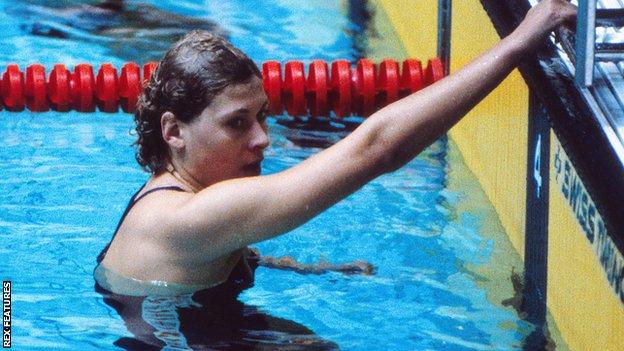ARTICLE AD BOX
 Sharron Davies finished 10 seconds behind East Germany's gold medallist Petra Schneider at the 1980 Moscow Olympics
Sharron Davies finished 10 seconds behind East Germany's gold medallist Petra Schneider at the 1980 Moscow OlympicsFormer swimmer Sharron Davies hopes she will be given the gold medal she feels is deserved from the 1980 Olympics.
Davies won silver for Great Britain in the 400m individual medley in Moscow behind East Germany's Petra Schneider who has since admitted doping.
Swimming's governing body Fina is now set to investigate past doping problems, such as East Germany's programme in the 1970s and 1980s.
"It would be lovely if it was recognised," Davies told BBC Wiltshire.
Schneider was more than 10 seconds quicker than Plymouth-born Davies when she set a new world record at the Moscow Olympics, a mark which stood for more than 17 years.
"For my Dad, who is now 85 and still coaching, it would be lovely if that medal could come whilst he's still here," added Davies, who won two Commonwealth Games gold medals as a 15-year-old in 1978.
"My parents made massive sacrifices when I was doing my sport, there wasn't lottery funding, we went without holidays, trips, new fridges and I remember my brothers going without new school uniforms so that I could do my sport."
'It wasn't like we didn't know at the time'
After the fall of the Berlin Wall and the end of communist rule in Eastern Europe the full extent of East Germany's doping programme became apparent.
Thousands of young athletes were given performance-enhancing drugs in a bid to bring sporting success in East Germany, with their women dominating swimming and athletics in particular.
The new head of Fina, Husain Al-Musallam, has vowed that the organisation will confront its past.
"Fina understands the concerns of athletes who have competed against others subsequently proved to have cheated," the organisation said in a statement.
"Athletes work their entire lives for a mere chance to compete for a medal, yet alone win one. So when athletes are denied the reward they worked so hard to achieve, Fina must do everything it can to right this wrong.
"Fina is committed to building aquatic sport on the strongest possible foundations. This is why Fina has begun a wide-ranging process of reform, part of which is the proposal - already approved by the Fina Bureau - for the creation of an independent Aquatics Integrity Unit.
"Once established, the independent Aquatics Integrity Unit will investigate the matter to determine what recourse may be taken in support of Ms Davies and all similarly-situated other aquatics athletes."
Davies says everyone at the time knew the East German women were cheating, but were unable to prove it until the reunification of the country more than 30 years ago.
"It wasn't like we didn't know at the time, we did, and then when the wall came down in 1989 we found all the paperwork," she added.
"We knew exactly what they were taking, when they were taking and who was taking it, it was just Fina didn't really want to do anything about it.
"We've had a change of president and he wants to fix this, he wants to acknowledge that nothing was done for two groups of people.
"People like myself who didn't win medals that they should have done, but also those young East Germans who were given very nasty old-fashioned drugs which had severe long-term side effects.

- NFL This Week: Watch all the highlights including NFL's return to London
- Oasis at Knebworth: Was this the crowning moment in Britpop history?


 3 years ago
29
3 years ago
29








 English (US)
English (US)